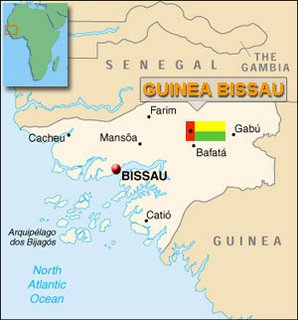
Guinea Bissau has been through a lot of drama, intrigue and bloodshed since its formal independence in 1975. “Phoenix-like” Nino Vieira has come a long way, managing to re-emerge with a re-election even after fleeing the country during the civil war. Despite being ousted he is once again Bissau’s strongman. Or is he? The place he once characterized as a “country of treasons” remains a place of passionate and complex personality politics, sprinkled with numerous party anxieties (both by the PAIGC and the Social Renovation Party) and terribly disoriented inter-institutional dynamics. Situation is unstable and uncertain, accusations frequent and mistrust high, but hope still has not abandoned one of the poorest countries on Earth.
The unfolding of the novel of Guinea Bissau will, as it always seems to have been, depend on the individualized fluidity and interactions between a handfull of politically connected and misconnected elites. Nino can be the strongman but he is not the “man of steel” he once thought of himself as anymore - Nino now “dances” more gracefully and carefully with a few shadow figures that lie under him in the castle of cards, figures such as Baptista Tagne Na Waie – the head of the Armed Forces (an Ansumane Mané “look-a-like” that keeps Nino on his toes).
How each political player regards himself in relation to other external regional and international actors has always been central to how internal politics have been played out. The politics of IMF, the World Bank, France, Portugal, ECOWAS, China, and the US always took precedence when framing the debate in detriment of the huge multiverse of local comités de tabanca and even spontaneous kingdomships (in isle of Pecixe, Jeta and in Caió) lying just outside Bissau, not to mention the vast majority of poor peasants to the northeast and to the south that remain almost completely detached from central government. For Guinea Bissau to change from the “country of treasons” to the “country of Gumbe” actors and policy-makers will have to also look at these units outside the capital center and, while bringing Civil Society to the forefront, tap into all these localities, rituals and longings for “making a life”. Peripheral places and apparently displaced macro-neighboorhoods that have, in the end, not only been left untapped for decades but also challenged by the centrifugal forces of “Ninocracies” and nearly decimated by chronic coup d'état "chair dances" and violent conflict.
No comments:
Post a Comment